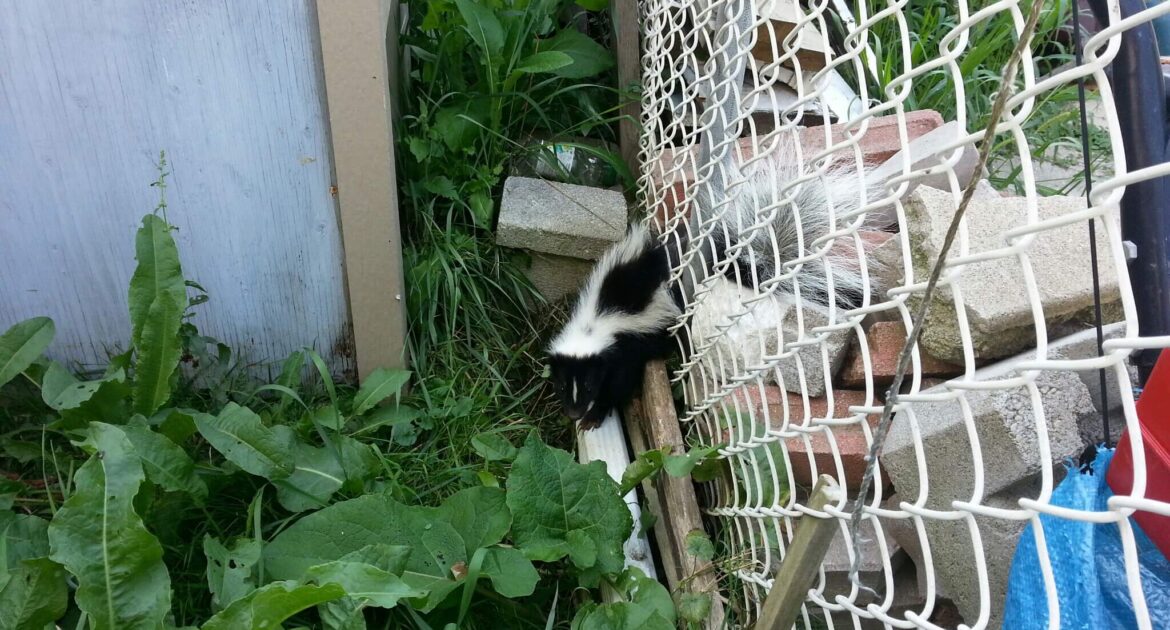Skunks are generally non-aggressive animals that prefer to be left alone. Unfortunately, if a skunk takes up residence on your property, it increases the chances of a confrontation. You may think that you can handle the situation on your own, but there are several excellent reasons why you should turn to professionals for humane skunk removal instead.
1. You Could Get Sprayed
Skunks gain the ability to spread their smelly spray at a very young age. They can produce the noxious fluid before their eyes are open, and by the time they grow to be adults, they can aim with pinpoint accuracy. Skunk spray usually doesn’t cause long-term harm, but it does cause severe short-term irritation that can include temporary blindness. Furthermore, even when the symptoms of skunk spray have resolved, the pervasive odour can linger for weeks and possibly even months.
Contrary to what many people seem to believe, skunks don’t spray out of malice. They actually try to avoid spraying if at all possible. It is only once a skunk feels threatened or protective of their babies will they spray their defensive spray. Once a skunk has sprayed, its body takes up to a week and a half to produce more fluid, leaving the animal vulnerable in the interim. Therefore, a skunk that sees an escape route will take it, and even a skunk that is cornered will give warnings that it intends to spray unless caught off-guard.
You may have nothing but good intentions in trying to remove skunks from your property, but the skunks have no way of knowing that you mean no harm. They are likely to feel threatened, and they won’t hesitate to spray if they feel they have no other options. This is especially true if it is a mother skunk with babies as she will be particularly protective of her offspring.
2. Skunks Can Carry Rabies
If a skunk’s spray is not effective, it may also use its teeth as a defensive weapon. In addition to raccoons and bats, skunks are one of the three most common carriers of rabies in North America. A skunk with an active rabies infection can spread the virus through its saliva by biting. Symptoms of rabies in skunks can include aggression and foaming at the mouth, as well as disorientation and fearlessness. However, the symptoms can be subtle. It is often difficult to tell by observing whether a skunk has rabies, so it is safer to assume that any skunk you see is rabid and call professional wildlife control while keeping a safe distance.
3. The Skunks May Not Go Away Entirely
Even if you succeed in evicting skunks from their den without getting sprayed or bitten and filling in the burrow they have dug, that might not solve your problem completely. Skunks are very adept at digging, and with their long claws, they are well equipped for it. They like to dig a burrow under a solid, sturdy object or structure that affords some protection. On your property, this may be a shed, a deck, or a porch. If you remove them from their current den, they can simply dig a new one under the same structure but in a different place. Having found a good place for a den, they are unlikely to desert it after one setback.
While they are digging under your deck they have the potential to cause costly structural damage while also leaving behind a large mess of bacteria in their feces. Skunks, don’t take the problem with them when they leave. even if others don’t take their place, the damage they caused will remain.
Call Skedaddle for Humane Skunk Removal
Our wildlife control services include exclusion to prevent the animals from coming back. For example, not only can we close off the skunks’ current den after removing them, we can dig a trench along the sides of the structure and install a barrier to prevent them from digging a new one. Learn about our skunk removal services in more detail.




